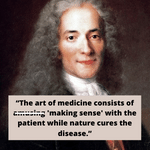Sorry, there is NO SUCH thing as low self-efficacy
Yeah controversial I know……..dragged you in though : )
But hang on, hear me out.
Self-efficacy is another one of these fancy terms that can now gets used to justify why the things that health care professionals do ‘work’….....
“oh it probably improves self efficacy”
This coincides with the emergence of self-efficacy as a important prognostic factor for recovery as we see here and here. Firstly, it is important to highlight prognostic data is often not interventional, so improving self-efficacy to improve outcomes makes sense but not yet fully supported by interventional data.
But is self efficacy actually a thing that can be low, high or improved? No!
WHY????
The point of self-efficacy is that it relates to something SPECIFIC.
"There is no all-purpose measure of perceived self-efficacy. The “one measure fits all” approach usually has limited explanatory and predictive value because most of the items in an all-purpose test may have little or no relevance to the domain of functioning” - Bandura HERE
So self-efficacy for what exactly, rather than just ‘self-efficacy’ is a really important question and one that is consistently missed out when discussing self-efficacy.
"self-efficacy is a judgment of capability to execute GIVEN types of performances
Bandura also makes some distinctions on some common terms that are often not well defined
"Perceived efficacy is a judgment of capability”
"Self-esteem is a judgment of self- worth”
"Locus of control is concerned, not with perceived capability, but with belief about outcome contingencies—whether outcomes are determined by one’s actions or by forces outside one’s control”
So essentially self-efficacy is simply not a stand-alone ‘thing’, it has to actually relate to something and I am going to use an example from Adam Meakins who made a good point to me in a recent discussion
"How much self-efficacy do you have around repairing your car?”
Now I might consider myself to have pretty high self-efficacy when it comes to most things using my body such as playing sports or general daily activities but take me outside of those and ask me to tile a bathroom or fix my car and suddenly it drops, significantly
Self efficacy for what?
We have so many self efficacy scales because they relate to different things.
The most common used is the PSEQ (pain self efficacy scale). This relates specifically to doing things WITH PAIN. So it’s not just self efficacy for anything….its moving IN pain!
Still fit with your narrative?
The PSEQ HERE
“assesses the confidence people with ongoing pain have in performing activities while in pain”
We also have the SEE which is the self efficacy for exercise scale, guess what that relates to? Um yeah….exercise.
Now because I am a critical B****** we could say that this whilst being DOMAIN specific to pain, it is still not activity or movement specific and if used without further questioning could miss the actual things that are actually bothering people.
Bandura's scale for pain management is really quite specific to controlling pain in comparison to the more general PSEQ.

Perhaps it is more low pain CONFIDENCE as a general measure?
Bandura himself distinguished the difference between self efficacy and self confidence as one being a more general measure (self confidence) and one a more specific (Self efficacy) measure. Perhaps it is best seen as a spectrum rather than simply one or the other, but it still relates to a domain or a specific within that domain rather than just simply SELF EFFICACY as a stand-alone thing.
Is the way we often discuss self-efficacy more a proxy for self-confidence, general functioning or coping? Is that important? I think it is if we start looking at self-efficacy from an interventional standpoint using the theory put forward by Bandura to justify ways of building self-efficacy as they relate specifically, well to the specifics!
Most questionnaires lack specifics and often need a proper conversation around them to tease out more specific movements, activities etc, the Fear Avoidance Belief Questionnaire suffers from this issue as well IMO. This is a common criticism of PROMS.
And this bring us onto the next point…..
General versus specific
Always a big question in therapy is “how specific do we need to be?” and this is no different with self efficacy.
The way I view it is, the more specific the problem then the more specific the answer probably needs to be. Problem is with a more general domain-based scale it’s pretty tough to know how specific we need to be. A specific approach may relate better to something general than a general thing might relate to something specific is a thought I often have.
So if the problem is a one of more general low confidence of using our bodies then doing general exercise or loading will probably have good results.
Is that confusing? Yeah probably : )
Exposure therapy
The most common way that we interact with self-efficacy or confidence is to simply practice or exposure to doing things we don’t currently or normally do. Clinically I think we often expose people to things that build their confidence in their bodies rather than change any physical measures.
Perhaps we are really helping keep the persons pain expectations more in line with the probable reality, that the current situation is bothersome but not inherently dangerous, and therefore normal life can resume. This helps avoid exaggerated cognitive responses that can limit engagement in activities and create disability and increased pain.
This is not really the true ‘exposure therapy’ that we may see around psychopathology such as the fears or phobias that we see in literature such as Craske et al as an example, but a ‘soft’ exposure I suspect can have a positive effect on confidence, violate expectancies and improve clinical outcomes. We should not confuse this though with more specific situations were general confidence building probably won’t make a huge difference.
‘Soft exposure’
I think this process happens a bunch in rehab.
We expose people to different things such as lifting weights, that are pretty general interventions and can have a really good effect on peoples levels of general belief and confidence in their bodies. But they might not have the same effect on someone who has very low self-efficacy around a specific task involving lifting say, in this case a deadlift might not cut it if I need to be contextually specific as we see in true exposure therapy.
So if a general thing helped then perhaps the problem was not that specific?
Many years ago in the 90’s I worked as a gym instructor. That pretty much was using exposure to improve the self-efficacy of people who had never come to the gym before. It involved relationship building, coaching and doing the thing they wanted to gain more confidence in, in this case a basic gym routine. Guess what? After a few weeks of doing I with a bit of support and getting comfortable in the surroundings and building a bit of a habit they improved their self efficacy!
Is it normal anyway?
If I have pain or have never done something before such as weight lifting then having low self-efficacy for this might be completely normal. I don’t see this as a clinically significant low self-efficacy, say under 30, as has been discussed, on the PSEQ and rarely gets measured anyway clinically.
People are a bit worried, their confidence has dropped, they are often more cautious of experiencing pain and using their bodies. Rather than an abnormal response it might be something quite normal. Perhaps it is the duration of these beliefs beyond what might be considered normal that is the problem?
Take away’s
• Self-efficacy is a not a thing
• The scale used generally relates to the thing
• The scale used to measure the thing can miss the thing
• General interventions work on general things
• Specific interventions work on specific things
• Exposure and confidence go hand in hand










Leave a Reply
Want to join the discussion?Feel free to contribute!